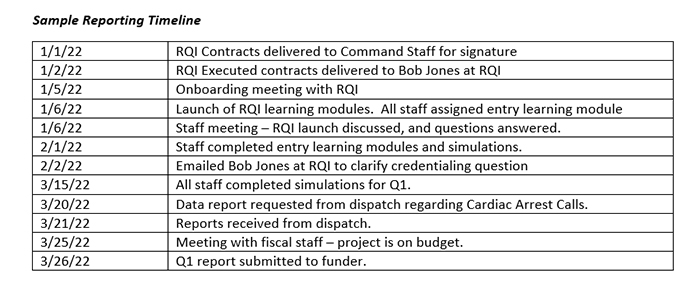In part three of this blog series, Stacey McShane shares what to do once your grant has been awarded. If you have not read Part 1 and Part 2 of this grant series we encourage you to do that first.
Managing your Grant Award
Congratulations! Your grant has been funded! Now it is time to manage your funds and program. If you started a notebook or electronic folder as recommended in our application blog, this is where you will organize your information.
Your Award Letter
First, you will need to thoroughly review the award letter. The funder will send you a letter outlining the amount that was funded and the requirements related to that funding.
- If the funder fully supported your requested amount, then you are good to move on to next steps.
- If the funder partially funded your program, you will need to determine if your agency will accept the funding.
- If your department cannot fill the funding gap or cannot accept the funding amount, you will need to respond to the funder in writing with an explanation of why you are declining the grant. This will allow them to move on and fund another project.
Accepting the Grant
Once you have determined your agency can accept the grant, notify the funder that you are accepting the grant and the terms they have outlined in the award letter. For federal and state funds, requirements are not negotiable. For private funding, you may be able to negotiate a term that does not work for your agency. Communication is key. Contact the funder with any concerns you may have and negotiate those terms. After accepting the grant, you will need to follow any internal procedures related to grant funding. Notify your fiscal and executive staff of the award. Your fiscal staff will be handling the reimbursements and purchases, so ensure they have copies of the application and award letter for their records. The grantor will provide funds in one of two ways:
- A check for the entire grant amount for deposit.
- Instructions on how to reimburse your agency once purchases are made.
Tracking and Reporting
It is extremely important to follow all records, tracking and reporting requirements outlined in the grant application and award. Failure to do so may result in your agency being required to repay funds. If fraud occurs, or your agency repeatedly fails to follow grant requirements, your agency may be put on a debarment list. Debarment will prevent you from applying for funds in the future. If your agency is part of a larger organization (such as a county department), a debarment could prevent the entire county from receiving grant funds.
Once you have read through the award letter, calendar any important dates. It is recommended you schedule reminders 2 weeks ahead of the date so you do not miss any important deadlines. Color coding grant deadlines on your calendar helps keep things organized.
Depending on the funder, you may have quarterly and/or annual reporting requirements. There may be milestones and important benchmarks that the funder wants to received data regarding. Make sure you give yourself plenty of time ahead of reporting deadlines to gather data and write the report. Most important: Turn the report in on time! If something happens that prevents you from reporting on time, communicate with the funder in writing. Often, they will offer you an extension. Failure to communicate will cause the funder to assume you are defaulting on your grant or that you are out of compliance of the grant agreement.
As you build your notebook and electronic file, keep detailed records of any correspondence, copies of reports, receipts for purchases and data. When it is time to close out the grant period, this information should be archived. Most states will require this information be retained for future audit or public disclosure.
It is recommended you keep your records current and update them monthly. Failure to keep updated records can result in not finishing your quarterly or annual reports on time. One process that may be helpful is to keep a fluid Word document or spreadsheet to act as a timeline and track any important information by date. This will assist you later during reporting. When filling out your reports you can reference your timeline, which will shorten the time digging for information.

Issues and Changes
As your project or program is implemented, you may discover you need to make changes. This could be changes in budget line items (shifting funds from one line item to another) or a deliverable timeline that was feasible when you applied is no longer doable. If this is the case, it is important to communicate with your funding partner. Make the request in writing and request they respond in writing. If the information is not documented, it essentially does not exist.
If you run into an issue, such as staffing, that is outside of your control and prevents you from remaining in compliance of the grant terms, contact the funder and explain the situation. The funder may choose to terminate the grant or they can work with you in determining the best course of action. Most funders do not want funds returned and will work with you to ensure funds are spent and the program gets back on track. Again, make any requests in writing. If the funder calls you to discuss, keep a log of conversation dates, times, and what was discussed. This will help you if there is a dispute later. It is helpful to email the person you talked to with a “per our conversation on X date and time, we will be shifting deliverable deadlines to X date.” This creates documentation and offers the funder the opportunity to clear up any miscommunication. This also creates documentation should the person you are dealing with leaves the funding organization and their replacement has questions.
Closing Out Your Grant
When the time comes to close out your grant, you will need to submit your final report to the funder. You will likely need to file the completed reports with any board/councils etc that oversee you agency. All documentation should be in a notebook and electronic file and archived according to your agency fiscal rules and state retention requirements. If you plan on apply for more funds, these documents will help you demonstrate success and continued need for funding.
Conclusion
Managing grants is not a difficult process as long as you stay organized and up to date on data collection and reporting requirements. Depending on the size of the project, it can easily be incorporated into daily tasks and management. We wish you success on your grant process and hope you will reach out to us if we can be of assistance.
For more information about the RQI pre-hospital programs visit https://rqipartners.com/solutions/prehospital-solutions/
This is the third post in the Grants series: You can read Part 1 and Part 2 here.








